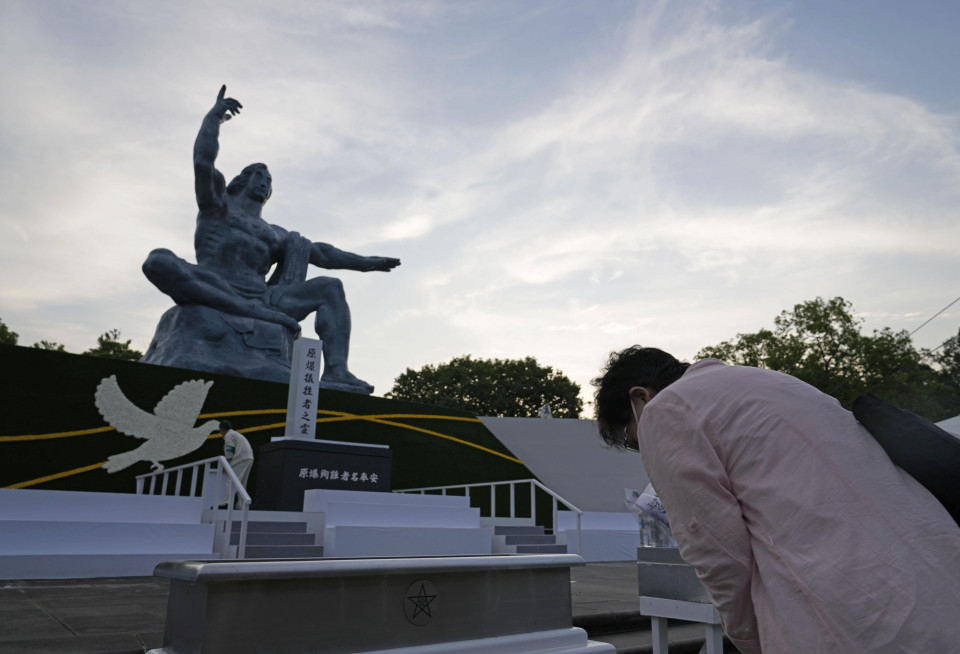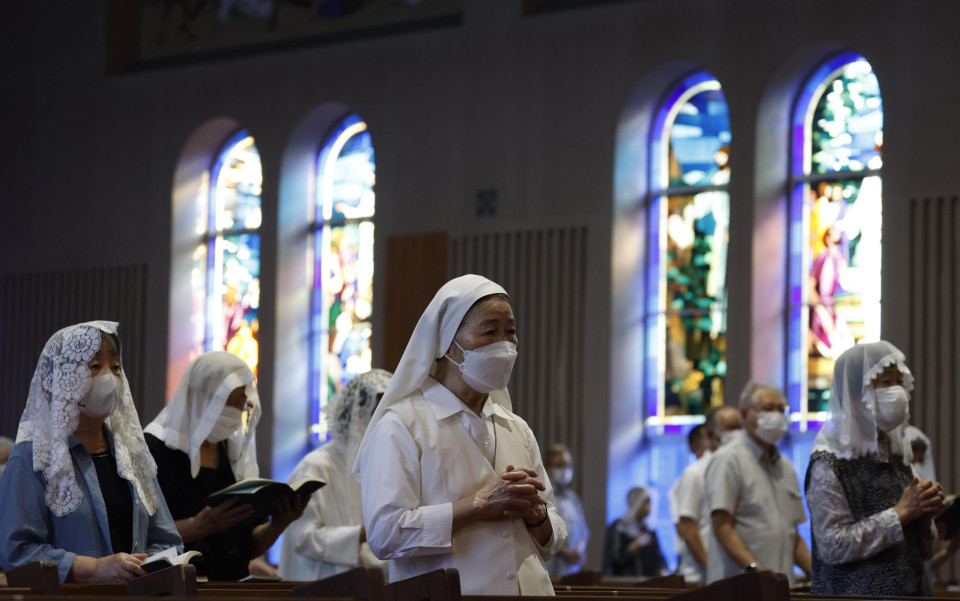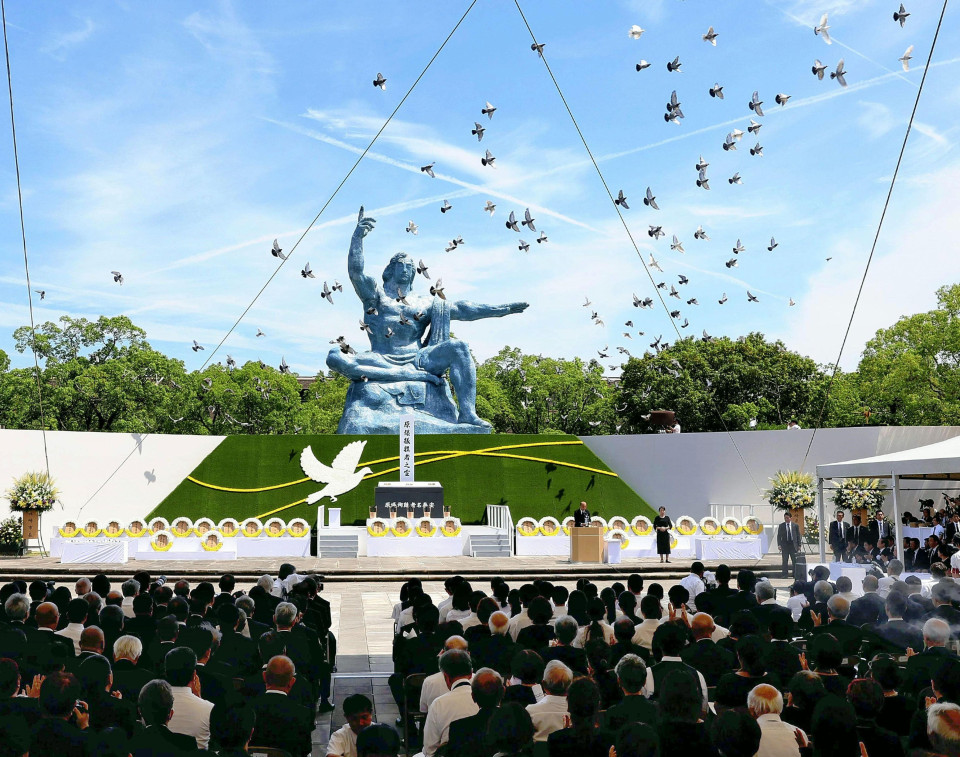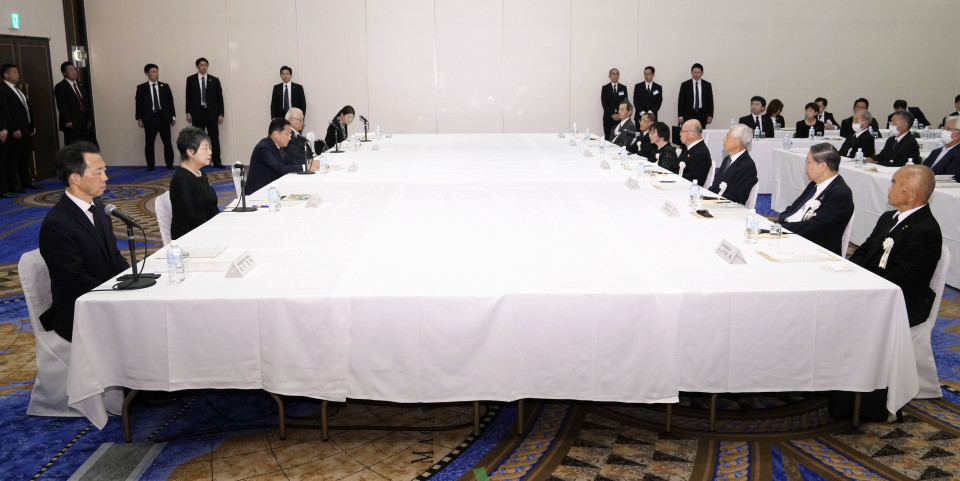Nagasaki called for a shift toward abolishing nuclear weapons on the 79th anniversary of the U.S. atomic bombing of the city on Friday, in the absence of ambassadors from the United States and other key nuclear states at its peace ceremony after they took issue with the city's decision not to invite Israel.
In a Peace Declaration delivered during the annual event, Mayor Shiro Suzuki underscored mounting concerns over the potential use of nuclear weapons due to increasing geopolitical uncertainties, while not directly mentioning Israel or Palestine.
"Amid uncertainty about when the Russian invasion of Ukraine will come to an end and growing concern about the expansion of armed conflicts in the Middle East, we are currently facing a critical situation with the increased likelihood of the disappearance of the important norm that we have conformed to thus far," he said.

He also called on leaders of the nuclear states and states under the nuclear umbrella to "face up to the reality that the very existence of nuclear weapons has posed an increasing threat to humankind, and you must make a brave shift toward the abolition of nuclear weapons."
A moment of silence was held at 11:02 a.m., the exact time when the plutonium bomb, codenamed "Fat Man," was dropped by a U.S. bomber and exploded over the port city in 1945. It remains the last place in the world to have suffered from an atomic bomb attack.
Suzuki demanded that the Japanese government sign and ratify a U.N. treaty banning nuclear weapons, and called for Japan to lead discussions to ease tensions and advance disarmament in Northeast Asia.
In his remarks during the ceremony, Prime Minister Fumio Kishida noted the "widening division" in the international community over approaches to nuclear disarmament and Russia's nuclear threat, saying, "Now is the time for us to continue with our passionate appeal to the world, 'Let Nagasaki be the last.'"
The ceremony at the Nagasaki Peace Park was attended by some 2,300 participants, including representatives from a record-high 100 countries and regions, including Palestine, according to the city government.
 People pray during a memorial mass at Urakami Cathedral in Nagasaki on Aug. 9, 2024, the 79th anniversary of the U.S. atomic bombing of the southwestern Japan city. (Kyodo) ==Kyodo
People pray during a memorial mass at Urakami Cathedral in Nagasaki on Aug. 9, 2024, the 79th anniversary of the U.S. atomic bombing of the southwestern Japan city. (Kyodo) ==Kyodo
Meanwhile, U.S. Ambassador Rahm Emanuel and British Ambassador Julia Longbottom, as well as the ambassadors of Canada, France, Germany, Italy and the European Union, skipped the ceremony in response to the city not inviting Israel. The members of the Group of Seven were instead represented by ministers and consul generals.
In a letter to the mayor in July, revealed Wednesday, the diplomats expressed concern that the lack of an invitation "would result in placing Israel on the same level as countries such as Russia and Belarus," which have been effectively barred from the ceremony over Moscow's invasion of Ukraine.
Speaking to reporters after attending the ceremony, French Minister-Counselor Nicolas Thiriet said, "It's very unfortunate that Israel was not invited and was put on the same level as Russia."
"The situation in the Middle East is very different from Russia's war aggression against Ukraine...Israel has been a victim of a terrorist attack and has every right to defend itself," he said.
On Thursday, Suzuki reiterated his explanation that Israel was not invited over fears that protests against the country's ongoing conflict in the Gaza Strip could affect the ceremony's solemnity, and the decision was "not political."
During a press conference later in the day, Kishida declined to comment on the nonattendance of some of the ambassadors, saying the ceremony was organized by the city of Nagasaki.

The move is in direct contrast with Hiroshima, another city that suffered a U.S. atomic bombing, which allowed Israeli representation at its ceremony while not inviting Palestine.
During the peace ceremony in Nagasaki, Seiichiro Mise, an 89-year-old atomic bomb survivor, known as hibakusha, read out a Pledge for Peace and called for the abolition of nuclear weapons as he shared the English phrase, "Peace is a world heritage shared by all humankind."
"As we look at the international situation, we see wars such as those in Ukraine and Palestine dragging on rather than ending, and many children are losing their lives," he said. "With this sad reality right before our eyes, we cannot look away from the foolishness of war."
Izumi Nakamitsu, U.N. undersecretary general and high representative for disarmament affairs, read out a statement by U.N. Secretary General Antonio Guterres, in which he wrote, "Eliminating these weapons is our highest disarmament priority...And yet, I worry the lessons of nearly eight decades ago have not been learned."
"We are seeing nuclear weapons -- and the threat of their use -- re-emerging as tools of coercion," he wrote.
Among those who came to pay their respects at the Hypocenter Park was Chibako Ota, 76. Her mother was around 2 kilometers north of the bomb in Nagasaki, and lost three children to the blast.
"Looking at the current global situation, I feel like nuclear weapons may be used again," she said. "I want people to come here to see what really happened and realize that it's not okay."
Hiroshi Nishioka, who experienced the atomic bombing of Nagasaki while at school as a student in junior high, attended the ceremony at the park.
"It goes without saying to be against nuclear weapons," the 92-year-old said after the event.
"What we can do as individuals regarding nuclear nonproliferation is limited," he added. "We must make the movement larger as an organization."

Kishida met with hibakusha and a person representing those who have not received official designation as survivors under current standards. The latter group, who are not eligible for the same health care as hibakusha, called for recognition as they become older.
The attack on Nagasaki came three days after a uranium bomb was dropped on Hiroshima some 300 kilometers to the northeast. An estimated 74,000 people were killed by the end of 1945, with many others suffering from the effects of burns and radiation-related illnesses long after the attack.
The combined number of officially recognized survivors of the two nuclear attacks stood at 106,825 as of March this year, down by 6,824 from a year earlier, according to the Ministry of Health, Labor and Welfare. Their average age exceeded 85.
Related coverage:
Nagasaki mayor says Israel exclusion from A-bomb event not political
U.S., Europe aired concern over no Israel presence at Nagasaki A-bomb event
FEATURE: Nagasaki anti-nuke sit-ins take on new gravity as threat grows
 By Toma Mochizuki,
By Toma Mochizuki,









